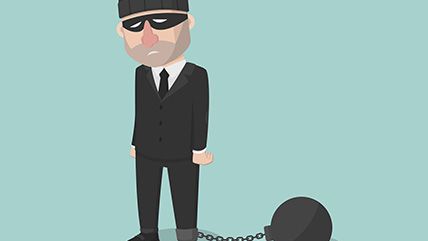Out of Prison Means Out of Work

One of the biggest and most important challenges facing the estimated 600,000 Americans who will be released from prison this year is the prospect of finding a job. Employment can be the difference between putting their lives together again or ending up back behind bars.
In many states, though, government makes it harder for the formerly incarcerated to find work, thanks to arbitrary restrictions written into state licensing laws that prohibit anyone with a criminal record from getting a professional license—even if his conviction had nothing to do with the occupation, and even if he's been out of prison for years.
In 29 states, occupational licensing boards are allowed to reject applications from anyone with a felony conviction. In Illinois, for example, a criminal record automatically disqualifies people from obtaining 118 different state licenses, preventing them from pursuing work as barbers, massage therapists, roofers, cosmetologists, and dozens of other professions.
With fewer options for legal work, the formerly incarcerated are more likely to resume a life of crime. That's the conclusion from a first-of-its-kind study released in November by the Center for the Study of Economic Liberty at Arizona State University. After reviewing licensing rules and recidivism rates for a 10-year period beginning in 1997, the study found that formerly incarcerated residents are more likely to commit a new crime within three years of being released from prison if they live in a state where they're prohibited from getting a license solely for having a criminal record.
Over the decade of the study, the average recidivism rate in the country—the rate at which formerly incarcerated people are convicted of new crimes that send them back to prison—rose by 2.6 percent. In the 29 states where a criminal record can disqualify you from getting an occupational license, the rate rose by 9.4 percent, researchers found, while it actually declined by 4.2 percent in states without those provisions in their licensing laws.
Even after factoring in a state's overall labor market conditions, there remains a statistically significant relationship between strict licensing laws and higher-than-average recidivism rates, says Stephen Slivinski, the author of the Arizona State study.
Lawmakers are starting to notice. "We want people to get out of prison and be able to have jobs," says Libertarian state Sen. Laura Ebke (District 32), who sponsored a bill this year to overhaul Nebraska's licensing laws and reduce the number of licenses that are off-limits to the formerly incarcerated. Even though several other licensing reforms made it to Republican Gov. Pete Ricketts' desk this spring, her bill is still waiting for a vote.
In Kentucky, the story has been more positive. A bill, sponsored by state Sen. Whitney Westerfield (R–Hopkinsville) and signed in April by Gov. Matt Bevin, removes the automatic prohibition on granting many licenses—including those for air conditioning and heating technicians, land surveyors, and several construction jobs—to the formerly incarcerated. Instead, the bill allows licensing boards to consider an applicant's criminal history as one of several components in determining whether to grant a license. It's a system that could be abused by boards determined to keep out competition, as already happens in some instances, but it's an improvement over the current system of blanket bans.
Proposals like Ebke's and Westerfield's make sense from an economic perspective too. A 2008 study from the Center for Economic Policy and Research, a left-leaning think tank, found that the United States has "lost as many as 1.7 million workers due to employment barriers for people with criminal records." If all of them were working, the nation's unemployment rate would be nearly a full percentage point lower, researchers found. In places like Kentucky, where the state's Chamber of Commerce estimates that there may be as many as 110,000 open jobs, the effect could be significant.
Criminal justice reform often focuses on liberalizing sentencing laws—loosening mandatory minimums, for example, or allowing for alternative forms of punishment. Those are valuable reforms, Arizona State's Slivinski says, but they "don't address how best to reintegrate someone into the labor force once they have served their sentence." The U.S. Department of Justice estimates that between 60 percent and 75 percent of formerly incarcerated people remain unemployed a year after being released.
"If they can't get a job," the Libertarian Party's Ebke says, "they're more likely to end up back in prison."
This article originally appeared in print under the headline "Out of Prison. Out of Work.."


Show Comments (51)